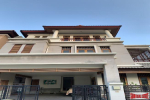2014/07/19 in Latest news - 40
Huge changes proposed for Phuket's taxi and tuk-tuk system
PHUKET: -- With the Army backing them, transport officials in Phuket are moving to make radical changes to the way taxis, tuk-tuks and minibuses operate on Phuket.
If they get their way, the surly groups of taxis and tuk-tuks waiting for fares and haggling for the highest possible amount, and the multitude of exclusive taxi territories dotted around the island will be a thing of the past.
Instead, all taxis will have meters and will be obliged to use them, resulting in a situation more like that in Bangkok.
Teerayut Prasertpol, Chief the Provincial Land Transport Office (PLTO) told The Phuket News today, “I have already sent a list of standard meter taxi fares to the [National Council of Peace and Order – NCPO].
“The first two kilometers will cost passengers B50, three to 12 kilometers will cost B12 per km, distances beyond that will be charged at B10/km.”
“The vehicles used must be no more than six years old, and must have engine capacities of at least 1,500cc.”
Suvarnabhumi Airport and Don Muang airport will be examples for Phuket International Airport to follow when it comes to taxi organisation. All meter taxi drivers who want to operate from the airport must initially register with the airport, giving such information as name, address, age, gender, photo, and details of the vehicle.
As at the Bangkok airports, taxis would arrive and join a queue to wait for passengers. Passengers would go to a taxi desk, state their destination and be given a slip to hand to the first driver in the queue.
This part of the plan has yet to receive agreement from the Phuket International Airport management, but it has been pointed out that the airport car park is a public area – technically a “special” area, but still public – so for the airport it may be legally difficult to block the entry of hundreds of meter taxis.
“We will talk with Phuket International Airport about taxis in the coming week,” Mr Teerayut said.
Under the plan, the PLTO would also open up the system to allow illegal “black plate” taxis to become legitimate – though not as green-plate “limousines”.
At first, the PLTO may issue probationary coloured plastic stickers for black-plate drivers to fix to their vehicles. The colour will probably be changed each year until eventually the drivers and their cars qualify for yellow public transport number plates.
As for the green-plate vehicles, at the airport no changes will be made. But other green-plate vehicles must been registered as being affiliated with a hotel or a tour company. The PLTO aims to cap the number of green-plates at current levels.
This is to push drivers towards driving meter taxis rather than “limousines”, Jaturong Kaewkasi, the PLTO’s Chief Adviser, explained.
“If all black-plate taxis could become meter taxis that would be good for Phuket.”
Another part of the plan is to tackle the tuk-tuk mess. The PLTO has in the past tried to limit the number of tuk-tuks but the rules have been constantly broken.
Currently, there is a huge underground market for yellow tuk-tuk plates, which can sell for a million baht or more, depending on demand.
But if the PLTO plan goes through, the plates will be non-transferable, which should more or less collapse the market. If any driver wants to stop driving a tuk-tuk (for example, to upgrade to a meter taxi) he or she must return the registration to the PLTO.
Minibuses are also to brought into line. There are currently just 20 minibuses on Phuket registered with yellow plates but, Mr Jaturong said, “More then 100 illegal minibuses operate on the island, none of which have registered their details with us.
“We will open up registration to them to allow them to become legitimate.”
There is no deadline for this. But nor will there be any mercy.
Mr Teerayut explained, “Drivers of any black-plate [tuk-tuk, minibus or taxi] we catch will be charged under Section 23 of the Motor Vehicles and Road Traffic Act.” Penalties for offenders can be as high as five years in jail.
Source: http://www.thephuket...ystem-47411.php





